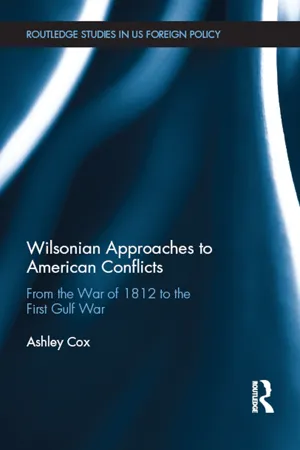History
US Entry into WW1
The United States entered World War I in 1917 after years of neutrality. Factors such as German submarine warfare, the interception of the Zimmermann Telegram, and economic ties with the Allies influenced the decision. President Woodrow Wilson sought to make the world "safe for democracy" and believed American intervention was necessary to achieve peace and stability.
Written by Perlego with AI-assistance
Related key terms
1 Key excerpts on "US Entry into WW1"
- eBook - ePub
Wilsonian Approaches to American Conflicts
From the War of 1812 to the First Gulf War
- Ashley Cox(Author)
- 2017(Publication Date)
- Routledge(Publisher)
This chapter will begin by addressing the traditional debates that focus on how the United States went to war for strategic and economic reasons. The second section will move on to discuss the Wilsonian interpretation of the events. The final section will address how we can use Mead’s Wilsonian framework to interpret Wilson’s decision for conflict and why this framework is an important analytical tool.The debateThis section will review the arguments that have been classically used to explain the American entry into the First World War. It will then go on to discuss the economic arguments that surrounded American entry into the conflict.The first strategic factor to consider is the classical interpretation of the origins of the First World War, which is that the United States acted only in its own strategic interest.7 This argument suggests that the United States had no need to concern itself with events in Europe until 1917 because Britain had been able to contain any potential hegemon. This section will begin by addressing the neo-realist assertion that the United States had pursued a ‘buck passing’8 strategy up to 1917 allowing the Allies to pay the price of containing Germany.9 This policy changed, so the realist argument goes, as the tide appeared to turn against the Allies in 1917. Thus the United States was forced to support the Allies when presented with potential German hegemony in Europe. In this analysis a victorious Germany would not only possess the strongest army in the world10 but it would shatter British naval supremacy, which played an important part in enforcing the Monroe doctrine.11 With the great powers of Europe defeated, Germany would be unopposed on its borders and as such could attempt to spread its influence to the new world and pose a threat to the United States.12 This scenario would not be appealing for the United States, which owed its own success in the Western Hemisphere to the lack of peer competitors and the balance of the European great powers. John Mearsheimer contends that ‘the United States entered World War One in good part because it thought that Germany was gaining the upper hand’.13
Learn about this page
Index pages curate the most relevant extracts from our library of academic textbooks. They’ve been created using an in-house natural language model (NLM), each adding context and meaning to key research topics.
